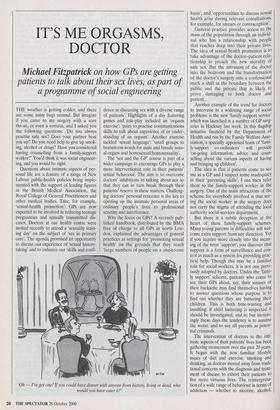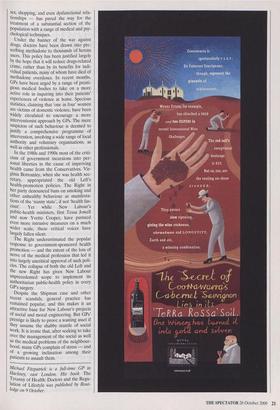IT'S ME ORGASMS, DOCTOR
Michael Fitzpatrick on how GPs are getting
patients to talk about their sex lives, as part of a programme of social engineering
THE weather is getting colder, and there are some nasty bugs around. But imagine if you came to my surgery with a sore throat, or even a verruca, and I asked you the following questions: 'Do you always practise safe sex? Does your partner beat you up? Do you need help to give up smok- ing, alcohol or drugs? Have you considered having counselling from a family-support worker?' You'd think it was social engineer- ing, and you would be right.
Questions about intimate aspects of per- sonal life are a feature of a range of New Labour public-health policies being imple- mented with the support of leading figures in the British Medical Association, the Royal College of General Practitioners and other medical bodies. Take, for example, `sexual-health promotion': GPs are now expected to be involved in reducing teenage pregnancies and sexually transmitted dis- eases. Doctors at our health centre were invited recently to attend a 'sexuality train- ing day' on the subject of 'sex in primary care'. The agenda promised an opportunity to discuss our experience of 'sexual history- taking' and to enhance our 'skills and confi- dence in discussing sex with a diverse range of patients'. Highlights of a day featuring games and role-play included an 'orgasm exercise': 'pairs to practise communications skills to talk about experience of or under- standing of an orgasm'. Another exercise tackled 'sexual language': 'small groups to brainstorm words for male and female sexu- al organs and homosexual/homosexuality'.
The 'sex and the GP' course is part of a wider campaign to encourage GPs to play a more interventionist role in their patients' sexual behaviour. The aim is to overcome doctors' inhibitions in talking about sex so that they can in turn break through their patients' reserve in these matters. Challeng- ing doctors' personal reticence is the key to opening up the intimate personal areas of ordinary people's lives to professional scrutiny and interference.
Why the focus on GPs? A recently pub- lished handbook, distributed by the BMA free of charge to all GPs in north Lon- don, explained the advantages of general practices as settings for 'promoting sexual health' on the grounds that they reach `large numbers of people on a one-to-one `Oh — I've got one! If you could have dinner with anyone from history, living or dead, who would you have cater it?' basis', and 'opportunities to discuss sexual health arise during relevant consultations, for example, for smears or contraception'.
General practice provides access to the mass of the population through an individ- ual who has a relationship with people that reaches deep into their private lives. The idea of sexual-health promotion is to take advantage of the doctor–patient rela- tionship to preach the new morality of safe sex. But the intrusion of the doctor into the bedroom and the transformation of the doctor's surgery into a confessional mark a shift in the boundary between the public and the private that is likely to prove damaging to both doctor and patient.
Another example of the trend for doctors to intervene in a widening range of social problems is the new 'family-support service' which was launched in a number of GP surg- eries in Hackney last week. In this flagship initiative financed by the Department of Health and run by the Family Welfare Asso- ciation, a specially appointed team of 'fami- ly-support co-ordinators' will provide `on-going information, advice and • coun- selling about the various aspects of having and bringing up children'.
The idea is that if patients come to see me as a GP and I suspect some inadequacy in their 'parenting skills', I can then refer them to the family-support worker in the surgery. One of the main attractions of the scheme for everybody involved is that see- ing the social worker in the surgery does not carry the stigma of attending the local authority social-services department.
But there is a subtle deception at the heart of these family-support schemes. Many young parents in difficulties will wel- come extra support from any direction. Yet if you inquire more closely into the mean- ing of the term 'support', you discover that support is a form of surveillance and con- trol as much as a system for providing prac- tical help. Though this may be a familiar role for social workers, it is not one previ- ously adopted by doctors. Under the
`fami- ly support' scheme, patients who come to see their GPs about, say, their sinuses or their backache may find themselves having to answer questions whose purpose is to find out whether they are battering their children. This is both time-wasting and insulting: if child battering is suspected it should be investigated, and is; but increas- ingly these days the tendency is to assume the worst, and to see all parents as poten- tial criminals.
The intervention of doctors in the inti- mate aspects of their patients' lives has been gathering momentum over the past 20 years. It began with the now familiar lifestyle issues of diet and exercise, smoking and drinking, as doctors moved away from tradi- tional concerns with the diagnosis and treat- ment of disease to exhort their patients to live more virtuous lives. The reinterpreta- tion of a wide range of behaviour in terms of addiction — whether to nicotine, alcohol,
sex, shopping, and even dysfunctional rela- tionships — has paved the way for the treatment of a substantial section of the population with a range of medical and psy- chological techniques. Under the banner of the war against drugs, doctors have been drawn into pre- scribing methadone to thousands of heroin users. This policy has been justified largely by the hope that it will reduce drugs-related crime, rather than by its benefits for indi- vidual patients, many of whom have died of methadone overdoses. In recent months, GPs have been urged by a range of presti- gious medical bodies to take on a more active role in inquiring into their patients' experiences of violence at home. Specious statistics, claiming that 'one in four' women are victims of domestic violence, have been widely circulated to encourage a more interventionist approach by GPs. The mere suspicion of such behaviour is deemed to justify a comprehensive programme of intervention, involving a wide range of local authority and voluntary organisations, as well as other professionals. In the 1980s and 1990s most of the criti- cism of government incursions into per- sonal liberties in the cause of improving health came from the Conservatives. Vir- ginia Bottomley, when she was health sec- retary, appropriated the old Left's health-promotion policies. The Right in her party denounced bans on smoking and other unhealthy behaviour as manifesta- tions of the 'nanny state', if not 'health fas- cism'. Yet while New Labour's public-health ministers, first Tessa Jowell and now Yvette Cooper, have pursued even more intrusive measures on a much wider scale, these critical voices have largely fallen silent.
The Right underestimated the popular response to government-sponsored health promotion — and the extent of the loss of nerve of the medical profession that led it into largely uncritical approval of such poli- cies. The collapse of both the old Left and the new Right has given New Labour unprecedented scope to implement its authoritarian public-health policy in every GP's surgery. Despite the Shipman case and other recent scandals, general practice has remained popular, and this makes it an attractive base for New Labour's projects of social and moral engineering. But GPs' prestige is likely to prove a wasting asset if they assume the shabby mantle of social work. It is ironic that, after seeking to take over the management of the social as well as the medical problems of the neighbour- hood, many GPs complain of stress — and of a growing inclination among their patients to assault them.
Michael Fitzpatrick is a frill-time GP in Hackney, east London. His book The Tyranny of Health: Doctors and the Regu- lation of Lifestyle was published by Rout- ledge on 9 October.



























































































 Previous page
Previous page